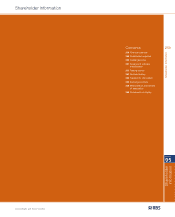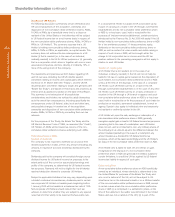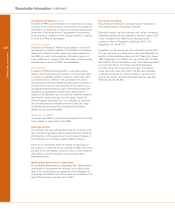RBS 2005 Annual Report Download - page 267
Download and view the complete annual report
Please find page 267 of the 2005 RBS annual report below. You can navigate through the pages in the report by either clicking on the pages listed below, or by using the keyword search tool below to find specific information within the annual report.
section
05
Shareholder
information
265
Shareholder information
Annual Report and Accounts 2005
business property of a UK permanent establishment of an
enterprise; or (iii) pertains to a UK fixed base of an individual
used for the performance of independent personal services.
The Estate Tax Treaty generally provides a credit against US
federal estate or gift tax liability for the amount of any tax paid
in the UK in a case where the non-cumulative dollar preference
share or ADS is subject to both UK inheritance tax and US
federal estate or gift tax.
UK stamp duty and stamp duty reserve tax (“SDRT”)
The following is a summary of the UK stamp duty and SDRT
consequences of transferring an ADS in registered form
(otherwise than to the custodian on cancellation of the ADS) or
of transferring a non-cumulative dollar preference share.
A transfer of a registered ADS executed and retained in the
United States will not give rise to stamp duty and an agreement
to transfer a registered ADS will not give rise to SDRT.
Stamp duty or SDRT will normally be payable on or in respect
of transfers of non-cumulative dollar preference shares and
accordingly any holder who acquires or intends to acquire
non-cumulative dollar preference shares is advised to consult
its own tax advisers in relation to stamp duty and SDRT.
X-CAPs
United States
Because the X-CAPs have no stated maturity, can be
exchanged for preference shares or ADSs at the option of the
company, would be treated as if they were preference shares in
a winding-up of the company, and the company may elect not
to make payments on the X-CAPs, the X-CAPs will be treated
as equity for US federal income tax purposes.
Payments (including any UK withholding tax, as to which see
below) will constitute foreign source dividend income for US
federal income tax purposes to the extent paid out of the
current or accumulated earnings and profits of the company,
as determined for US federal income tax purposes. Payments
will not be eligible for the dividends-received deduction allowed
to corporate US Holders. A US Holder who is entitled under the
Treaty to a refund of UK tax, if any, withheld on a payment will not
be entitled to claim a foreign tax credit with respect to such tax.
Subject to applicable limitations that may vary depending upon
a holder’s individual circumstances, dividends paid to certain
non-corporate US Holders in taxable years beginning before
1 January 2009 will be taxable at a maximum tax rate of 15%.
Non-corporate US Holders should consult their own tax
advisers to determine whether they are subject to any special
rules that limit their ability to be taxed at this favourable rate.
A US Holder will, upon the sale, exchange or redemption of
X-CAPs, generally recognise capital gain or loss for US federal
income tax purposes (assuming that in the case of a
redemption, such US Holder does not own, and is not deemed
to own, any ordinary shares of the company) in an amount
equal to the difference between the amount realised (excluding
in the case of a redemption any amount treated as a dividend
for US federal income tax purposes, which will be taxed
accordingly) and the US Holders tax basis in the X-CAPs.
A US Holder who is liable for both UK and US tax on gain
recognised on the disposal of the X-CAPs will generally be
entitled, subject to certain limitations, to credit the UK tax
against its US federal income tax liability in respect of such gain.
Gain or loss will not be recognised by a US Holder upon the
exchange of X-CAPs for preference shares or ADSs pursuant
to the company’s exercise of its exchange right. A US Holder’s
basis in the preference shares or ADSs received in exchange
for its X-CAPs will be the same as the US Holder’s basis in the
X-CAPs at the time of the exchange and the US Holder’s holding
period for the preference shares or ADSs received in the exchange
will include the holding period of the X-CAPs exchanged.
United Kingdom
Taxation of payments of interest
Payments on the X-CAPs will constitute interest rather than
dividends for UK withholding tax purposes. However, the
X-CAPs will constitute ‘quoted eurobonds’ within the meaning
of section 349 of the Income and Corporation Taxes Act
1988, and therefore payments of interest will not be subject
to withholding or deduction for or on account of UK taxation
as long as the X-CAPs remain at all times listed on the New
York Stock Exchange or some other recognised stock
exchange within the meaning of section 841 of the Income
and Corporation Taxes Act 1988. In all other cases an amount
must be withheld on account of UK income tax at the lower
rate (currently 20%) subject to any direction to the contrary
by HM Revenue & Customs under the Treaty and except that
the withholding obligation is disapplied in respect of payments
to persons who the company reasonably believes are within
the charge to corporation tax or fall within various categories
enjoying a special tax status (including charities and pension
funds), or are partnerships consisting of such persons (unless
HM Revenue & Customs directs otherwise).
If interest were paid under deduction of UK income tax (e.g.,
if the X-CAPs lost their listing), US Holders may be able to
claim a refund of the tax deducted under the Treaty.
Any paying agent or other person through whom interest is
paid to, or by whom interest is received on behalf of, an
individual, may be required to provide information in relation
to the payment and the individual concerned to HM Revenue &
Customs. HM Revenue & Customs may communicate this
information to the tax authorities of other jurisdictions.
HM Revenue & Customs confirmed at around the time of issue
of the X-CAPs that interest payments should not be treated as
distributions for UK tax purposes by reason of (i) the fact that
interest may be deferred under the terms of issue or (ii) the
undated nature of the X-CAPs, provided that at the time an
interest payment is made, the X-CAPs are not held by a
company which is ‘associated’ with the company or by a
‘funded company’. A company will be associated with the
company if, broadly speaking, it is in the same group as the
company. A company will be a ‘funded company’ for these
purposes if there are arrangements involving that company
being put in funds (directly or indirectly) by the company, or
an entity associated with the company. In this respect,



















